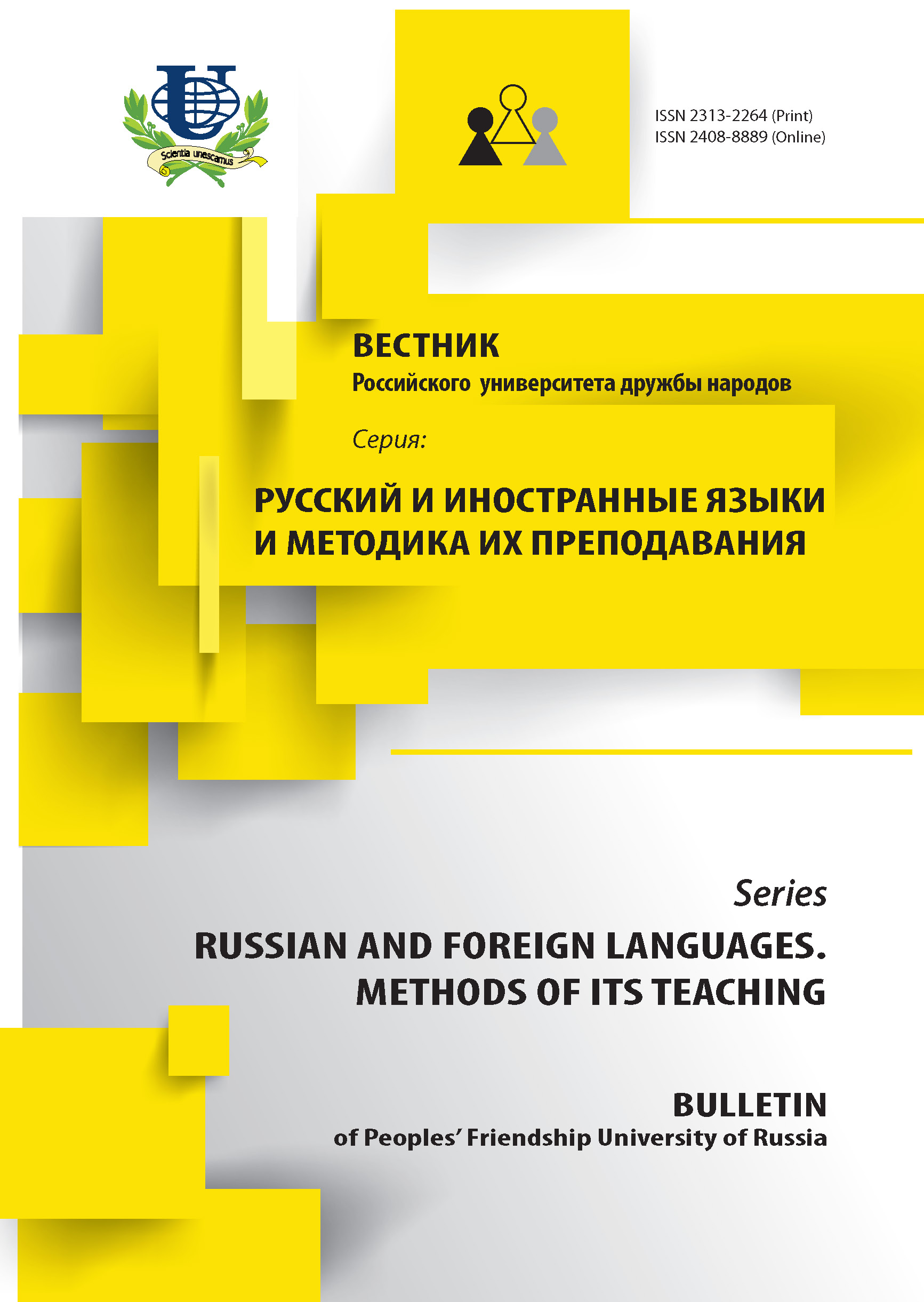No 1 (2009)
- Year: 2009
- Articles: 15
- URL: https://journals.rudn.ru/russian-language-studies/issue/view/623
Articles
Relevance of concept «outlook» in system of training to foreign languages
Abstract
Complex of psychological ideas defining formation of world outlook system of training to foreign languages, the analysis of a motivational complex of process of training, influence of personal characteristics of participants of educational activity on training success are discussed in article.
Russian Language Studies. 2009;(1):5-10
 5-10
5-10


Antinomy as typologic feature of ancient orthodox liturgic poetri
Abstract
Rhetoric forms of expressing of philosofic - theologic antinomies in context of Russian phenomenological hermenevtics are analysed in this article. The author studies universal principles of conversion of starting formulas, special features of translation of bysantine hymnografics in ancient Slavonic languages basig on ancient Slavonic manuscripts.
Russian Language Studies. 2009;(1):11-18
 11-18
11-18


Of yangmen's slang as contradictory phenomenon in the contemporary linguistics
Abstract
Clause is devoted actual in a modern linguistic science to a problem of definition of the status youth slang in system of national language. As a result of the analysis of the given subsystem contradictions in its language and structural maintenance are revealed.
Russian Language Studies. 2009;(1):19-25
 19-25
19-25


Addressing in russian speech etiquette from point of view of vietnamese native speakers
Abstract
The article deals with one of the basic formulas of Russian speech etiquette - «addressing» - against a background of Vietnam lingvoculture. Its characteristics and usage in different intercourse situation between communicators of various categories are also demonstrated.
Russian Language Studies. 2009;(1):26-31
 26-31
26-31


 32-35
32-35


Somatic expressions in Krylov's fables
Abstract
Somatic expressions used for describing feelings and emotional states of personages of Krylov's fables are being investigated in the article. Conclusions about functions of the somatic expressions and their peculiarities are made in the article. Special attention is paid to the somatic expressions containing national information and also to the cases of their usage in the unusual (authorial) meaning.
Russian Language Studies. 2009;(1):36-41
 36-41
36-41


 42-46
42-46


 47-54
47-54


 55-62
55-62


Historical conditions of language contacts of the uzbek language
Abstract
Article is devoted to historical conditions of language contacts of the Uzbek language. Article deals with pressing questions of history of language contacts of the Uzbek language, defines their epochs of development, the qualitative characteristic of the occurred changes, conditions of penetration of different language modules.
Russian Language Studies. 2009;(1):63-69
 63-69
63-69


Motivation of bird nomination in the russian and german languages
Abstract
The article deals with the problem of motivation of the ornithonemes in Russian and German languages; it is concerned with the typology of motivation characteristics of this lexico-semantic group. The most active motivation characteristics are distinguished which were put into the basis of bird nomination in both languages.
Russian Language Studies. 2009;(1):70-77
 70-77
70-77


Russian language spoken by foreigners in XVI-XVII
Abstract
The present paper describes how the foreigners perceived and reproduced the Russian words in XVI-XVII according to the facts described in the Notes of Moskoviya by S. Herberstein and A. Olearius. The authors examine a graphic and phonetic presentation of the Russian words as well as change in their morphological appearance and lexical meaning under the influence of the native language.
Russian Language Studies. 2009;(1):78-83
 78-83
78-83


Review to the monograph S.K. Miloslavskoy «The Russian language as foreign in the history of the formation of the European means of Russia»
Russian Language Studies. 2009;(1):84-86
 84-86
84-86


Synopsis of monograph I.E. Postnovoy «The Pretsedent texts in the advertisement»
Russian Language Studies. 2009;(1):87-88
 87-88
87-88


Synopsis «The teaching aid for the student-philologists: systematic approaches and the solution»
Russian Language Studies. 2009;(1):89-90
 89-90
89-90















